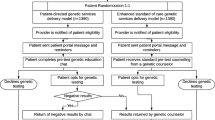Abstract
Various models of cancer genetics service delivery have been published, and practice guidelines were set forth by the National Society of Genetic Counselors (NSGC) in 2004. While the demand for services has increased, there has not been a comprehensive study of current practice models. An online survey of the NSGC Familial Cancer Risk Counseling Special Interest Group was conducted to study current methods of providing clinical cancer genetics services. Respondents were asked to quantify patient volume, support staff availability, and physician involvement in cases. Two case examples were used to further describe current practices including the number of genetic counseling tasks performed, time spent in these tasks, and number of in-person visits versus phone encounters. Although published cancer genetic counseling guidelines advise a 3-visit model (initial consult, sample draw, and result disclosure), 29.3% of respondents have adopted a 1-visit model, where the sample is drawn at the first visit and phone disclosure replaces the third visit. The content of the initial consult does not vary significantly, and is consistent with the NSGC practice guidelines. Furthermore, 56% report spending >15 min on case preparation, and 27 respondents self-reported redundancy in tasks such as documentation. It appears that a proportion of genetic counselors are following a new model of service delivery. However, insufficient documentation and case preparation are apparent, and many respondents reported lack of support staff as a barrier to efficient patient care. Factors contributing to the variability in current practice, and how they affect efficiency, require further study.

Similar content being viewed by others
Abbreviations
- NSGC:
-
National society of genetic counselors
- NSGC Cancer SIG:
-
National society of genetic counselors familial risk cancer counseling special interest group
References
Biesecker BB, Boehnke M et al (1993) Genetic counseling for families with inherited susceptibility to breast and ovarian cancer. JAMA 269(15):1970–1974
International Huntington Association and the World Federation of Neurology Research Group on Huntington’s Chorea (1994) Guidelines for the molecular genetics predictive test in Huntington’s disease. Neurology 44(8):1533–1536
International Huntington Association and the World Federation of Neurology Research Group on Huntington’s Chorea (1994) Guidelines for the molecular genetics predictive test in Huntington’s disease. J Med Genet 31(7):555–559
Brain K, Sivell S et al (2005) An exploratory comparison of genetic counselling protocols for HNPCC predictive testing. Clin Genet 68(3):255–261
American Society of Clinical Oncology (2003) American Society of Clinical Oncology policy statement update: genetic testing for cancer susceptibility. J Clin Oncol 21(12):2397–2406
Khatcheressian JL, Wolff AC et al (2006) American Society of Clinical Oncology 2006 update of the breast cancer follow-up and management guidelines in the adjuvant setting. J Clin Oncol 24(31):5091–5097
Lancaster JM, Powell CB et al (2007) Society of Gynecologic Oncologists Education Committee statement on risk assessment for inherited gynecologic cancer predispositions. Gynecol Oncol 107(2):159–162
Murphy CD, Lee JM et al (2008) The American Cancer Society guidelines for breast screening with magnetic resonance imaging: an argument for genetic testing. Cancer 113(11):3116–3120
Winawer S, Fletcher R et al (2003) Colorectal cancer screening and surveillance: clinical guidelines and rationale-update based on new evidence. Gastroenterology 124(2):544–560
Trepanier A, Ahrens M et al (2004) Genetic cancer risk assessment and counseling: recommendations of the national society of genetic counselors. J Genet Couns 13(2):83–114
Bernhardt BA, Tumpson JE, Pyeritz RE (1992) The economics of clinical genetics services. IV. Financial impact of outpatient genetic services on an academic institution. Am J Hum Genet 50(1):84–91
Bernhardt BA, Weiner J et al (1987) The economics of clinical genetics services. II. A time analysis of a medical genetics clinic. Am J Hum Genet 41(4):559–565
Cooksey JA, Forte G et al (2006) The medical genetics workforce: an analysis of clinical geneticist subgroups. Genet Med 8(10):603–614
Schneider K (2002) Counseling about cancer, 2nd edn. Wiley-Liss, Inc., New York City
McPherson E, Zaleski C et al (2008) Clinical genetics provider real-time workflow study. Genet Med 10(9):699–706
Kausmeyer DT, Lengerich EJ et al (2006) A survey of patients’ experiences with the cancer genetic counseling process: recommendations for cancer genetics programs. J Genet Couns 15(6):409–431
Stopfer JE (2000) Genetic counseling and clinical cancer genetics services. Semin Surg Oncol 18(4):347–357
Armel SR, McCuaig J et al (2009) The effectiveness of family history questionnaires in cancer genetic counseling. J Genet Couns 18(4):366–378
Jenkins J, Calzone KA et al (2007) Randomized comparison of phone versus in-person BRCA1/2 predisposition genetic test result disclosure counseling. Genet Med 9(8):487–495
Baumanis L, Evans JP et al (2009) Telephoned BRCA1/2 genetic test results: prevalence, practice, and patient satisfaction. J Genet Couns 18(5):447–463
Baker D, Eash T et al (2002) Guidelines for writing letters to patients. J Genet Counsel 11(5):399–418
Irons M (2008) The genetics clinic: where does the time go? Genet Med 10(9):657–658
Acknowledgments
This study was supported by the NSGC Familial Cancer Risk Counseling Special Interest Group Grant Award. The authors would like to thank Dawn Allain and Sarah Coombes for their contribution to the pilot study.
Author information
Authors and Affiliations
Corresponding author
Rights and permissions
About this article
Cite this article
Wham, D., Vu, T., Chan-Smutko, G. et al. Assessment of clinical practices among cancer genetic counselors. Familial Cancer 9, 459–468 (2010). https://doi.org/10.1007/s10689-010-9326-9
Published:
Issue Date:
DOI: https://doi.org/10.1007/s10689-010-9326-9




